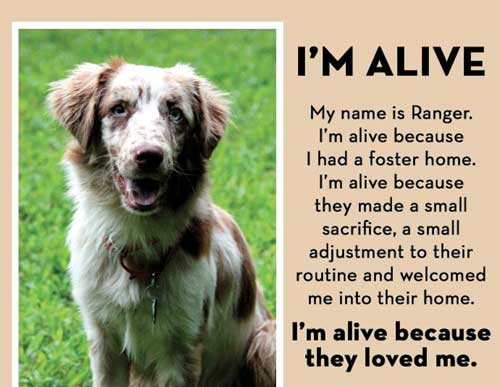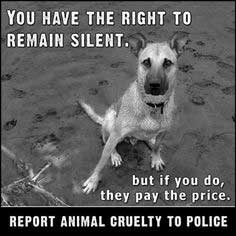- Home
- Save A Pet
- Community Rescue Pets
Community Rescue Pets
How The Animal Rescue Community Come Together To rescue Pets And Other Animals
By Susan Donaldson, B.A. (Hons), Animal Campaigner
Community Rescue Pets bring together the many different parts of the animal rescue community. All these different elements work together to rescue pets and other animals.
You will see on this page how they all work to get an animal to safety. You can also see if you would like to get involved with any of these aspects.
There are numerous hurdles an abandoned animal has to get over in order for its life to be saved. If it falls at any one of these hurdles, it will sadly lose its life. You will learn about the many hurdles each animal has to face.
If it wasn’t for the efforts of the many different volunteers involved in the animal rescue community, all doing their bit to help animals get over each hurdle, many more innocent animals would die.
The Problem
There are too many pets bred, too many abandoned, and not enough adopted or fostered from rescues. This results in numerous animals competing for every one available rescue space.
The lucky animal gets the rescue space, but sadly the others will be destroyed to make room in the pounds for more abandoned animals.
For more information about this, see this pet abandonment page. Raising awareness of the problem by sharing the information will help the situation.
Encouraging adoption over buying of pets online, among family and friends, and in your community, will also help.
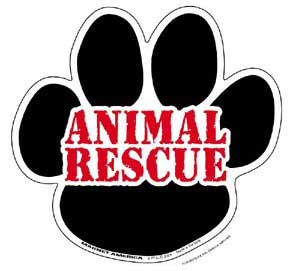 Community Rescue Pets
Community Rescue PetsAnimal Rescue Paw
Contents
- 1. The Pound: The Dog Pound And Cat Pound/Municipal Shelter
- 2. Pound Pullers
- 3. Cross-Posters
- 4. Emergency Boarding
- 5. Volunteer Animal Transporter
- 6. Animal Rescue Shelters
- 7. Animal Foster Homes
- 8. Home Checkers
- 9. Animal Adopters
- 10. So Many More!
- 11. What Can I Do To Help?
- 12. How To Make The World A Better Place For Animals
- 13. Other Ways To Help Stop Animal Suffering
The Pound: The Dog Pound And Cat
Pound/Municipal Shelter
An abandoned animal’s journey can often begin when it is brought into the Pound. It can be brought in either as a stray by an animal control officer, or by an owner. Sometimes owners do not want to admit they are abandoning their pet, so say they found it.
The animal pound can be a dog pound or a cat pound, or both. It can also be called a municipal shelter and is run by the local authority.
It can be a purpose-built structure owned and run by the local authority,. Alternatively, it can be a privately owned commercial kennels or cattery that the local authority use. The kennels used can change, depending on who wins the council /local authority contract.
It Is The Law For Stray Animals To Go To The Pound
The law dictates that stray pets must be taken to the pound. If the owner is looking for their pet, they would contact local pounds to see if it had been taken there.
If a member of the public sees a stray dog, they often call the dog warden/animal control officer. They usually do not realise the dog is only given a limited amount of time to live once at the pound.
If a member of the public takes a stray pet they have found to an animal rescue instead, by law the rescue must hand it over to the local authority pound.
Different Areas Give Different Amounts Of Time
In the UK, animals are held in the local authority pounds and shelters for seven days, except in Northern Ireland where it is five days. In the US, where the problem of abandoned dogs is even worse, it can be as little as 72 hours.
If it looks unlikely that the dog will be claimed, then towards the end of that time, some lucky dogs have pound pullers who race against the clock to try to find them life-saving rescue spaces.
If a rescue space cannot be found in time, animals are destroyed to make room for the constant influx of animals arriving.
A relatively small number of animals are claimed from the pound by their owners. Sadly, most are not. Owners have to pay a fee to collect them. Sometimes the fee makes owners decide to leave the pet in the pound.
Without the help of “pound pullers”, animals in these pounds have no chance of finding rescue spaces. Volunteer “Pound Pullers”, or pound pulling organisations, to try to find available rescue spaces for the animals, before their time runs out at the pound, and they are put to death. (see section below for more information)
Not only does the pound get stray animals brought in to them, but owners give their own pets up at the pounds too.
A few animal pounds in the UK allow the public to adopt a pet direct from them. More often, though, they insist that animals must find a rescue space with an animal rescue. This is so the animal rescue can properly assess the rescue pets before re-homing them.
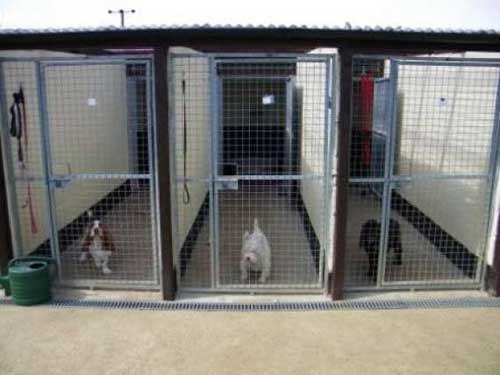 Community Rescue Pets
Community Rescue PetsEmergency Boarding Kennels
COMMUNITY RESCUE PETS
Pound Pullers
Pound pullers are compassionate volunteers who volunteer either on their own, or as part of a pound pulling organisation.
They can also be known as pound helpers. They go into animal pounds and get photos and details of the pets soon to be put to death, if they don’t find a rescue space.
Desperately Appealing For A Rescue Space
They then publicise the animals everywhere they can online, especially on social media sites like Facebook and Twitter.
The post shows the animal's photo and details, asking rescues to offer them a rescue space. Other people are needed to share the posts.
Pound pullers, and people who see the posts also contact numerous animal rescues directly.
They desperately attempt to find an available rescue space at an animal rescue anywhere in the country.
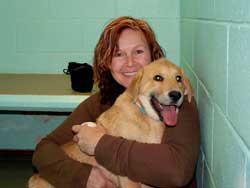 Community Rescue Pets
Community Rescue PetsA pound puller with a dog happy to see them
Emergency Boarding To Buy More Time
Pound pullers do not usually have their own premises, but with donations from the public, they can pay for the animal to be put in Emergency Boarding.
This is essential for when the animal is offered a rescue space that will not be available until after their time is up at the pound.
It can also give the animal longer to find a rescue space. However, many pounds do not allow animals without a rescue space offer to be put into EB. This sadly means they are put to sleep when their time at the pound is up.
Pound Pullers Mean They At Least Have A Chance
Unfortunately, many pound animals do not have the life line of a pound puller working with their pound. Where this is the case, they have virtually no chance of having their life saved.
The work of a pound puller can be heart breaking, but is also hugely rewarding. There are always more pound pullers needed to give more dogs a chance.
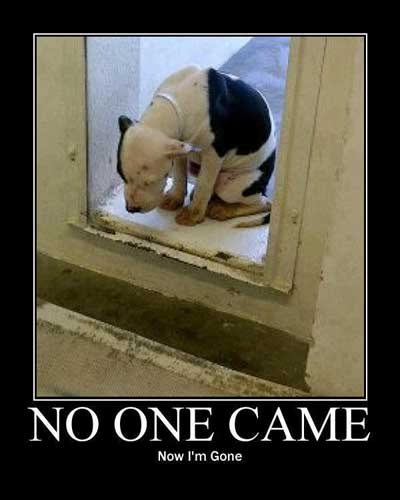 Community Rescue Pets
Community Rescue PetsA Very Sad Pound Dog
Cross-Posters
I mentioned above that pound pullers ask on Facebook and other social media sites for people to share the details of the pound animals they post. Doing so is called “Cross Posting”.
Anyone Can Be A Cross-Poster
Cross posters are ordinary people who have profiles on social media websites, such as Facebook, Twitter and Instagram. They share the details of the animals the pound puller is trying to save.
The more people who cross post, the higher the chance a rescue space will be found to save the animal’s life. If an animal is not cross-posted by many people, the chance that they will find a rescue space is much diminished.
Myth: “I’d Be No Use As I Don’t Have Links With Rescues”
Although not always, cross posters can have friends on social media who are interested in animals.
Some even have links to the animal rescue community. If they share the posts where their friends can see them, they are likely to share them too.
Even if they do not have animal lover friends, cross posters are still needed to cross post to groups and pages that help animals find rescue spaces.
It is important that people sharing the post share the ORIGINAL post, by clicking on the image in the post, they see. The post that then appears is the one that needs to be shared.
Where Do Cross Posters Find Posts To Be Cross Posted?
There are social media pages and groups where pound pullers post the animal's photo and details. An example is the Deathrow Dogs UK group on Facebook. People can share the posts from such groups and pages.
A post on social media to be shared, or “cross-posted”. Cross-posting helps the dog find a life-saving rescue space before her time is up in the pound, and she is put to death.
This dog below is in the US, where very high numbers of pets are destroyed because no rescue spaces are available.
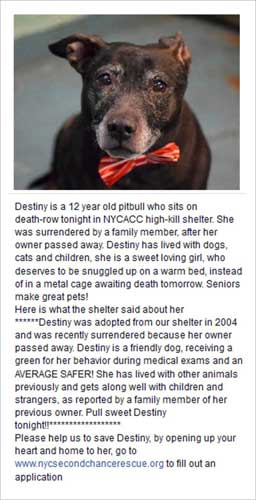 Community Rescue Pets
Community Rescue PetsCross posting helps dogs find life-saving rescue spaces
Emergency Boarding
Sometimes animals get the offer of a rescue space, but it is not available until after their time has run out at the pound. Thanks to donations from the public, they can be put in emergency boarding by pound pullers.
Emergency boarding is also sometimes used to give the animal longer to find a rescue space. However, many pounds will not allow pets to go into emergency boarding without a rescue space offer. This sadly often means that the pet's time often runs out before a rescue space is found.
The Public Can Donate To Help Pet Get EB
Pound pullers, who try to help pound animals find rescue spaces, often set up rescue funds for each animal. The public can donate to these funds.
People can often choose to donate to help a particular animal, or they can opt for their donation to be used to help the animal who most urgently needs it at the time. One pound pulling organisation who does this in the UK is Pounds For Poundies.
EB Is Usually At Commercial Kennels
Pound pullers do not usually have their own premises and emergency boarding is usually in commercial boarding kennels. It is often kindly given at a reduced rate.
If a rescue space has been found, anything left in the rescue fund after emergency boarding costs can go towards the rescue pets other rescue costs. These can include vaccinations, neutering, worming, and other necessary veterinary checks and treatment.
If the animal is lucky enough to be found a rescue space, a way has to be found to get the animal to it, and it may be hundreds of miles away. Volunteer animal transporters are then needed (see section below).
Without pound pullers, emergency boarding, public donations, rescue space offers, and many more elements of animal rescue, many more abandoned animals would be put to death in local authority pounds.
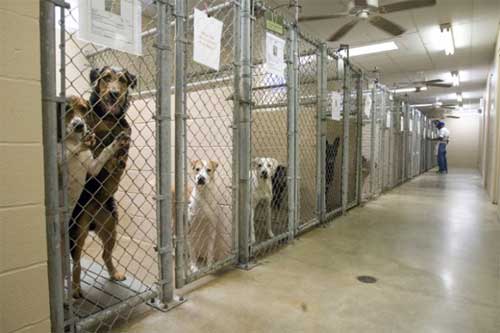 Community Rescue Pets
Community Rescue PetsWithout help, many dogs will die unnecessarily
COMMUNITY RESCUE PETS
Volunteer Animal Transporter
On social media sites, such as Facebook, there are volunteer animal transporter groups. They try to organise for rescue pets to be transported to their life-saving rescue space. The rescue can often be hundreds of miles away.
These Volunteer Animal Transporting groups, on social media sites, are always in desperate need of volunteers. Even just to drive an hour or so of the journey near to where they live, they are needed. One such group is this one.
More People Are Always Needed Everywhere
People are needed who live anywhere and everywhere to get the animal to the rescue space. If the animal cannot be transported to the rescue space quickly, they will lose it. It will be offered to one of the many other animals also needing it.
Animal Transport volunteers usually use their own vehicles. Quite often, there are no funds available to reimburse their fuel costs. They tend to do it through the love of animals and wanting to save their lives.
 Community Rescue Pets
Community Rescue PetsA dog being transported by car by a volunteer. Many transporters are advised to use secure dog crates
A Relay Of Journeys Needs To Be Organised
It normally takes a number of volunteers to form a complete chain for each journey. If just one person cannot do their part of it for some reason, the whole journey falls apart. This happens regularly.
Occasionally, there are volunteers so dedicated that they will drive a complete journey of hundreds of miles, just to make sure the animal gets to its rescue space.
No Kill Rescues Are Highly Sought After
If an animal successfully makes it into a rescue space at an animal rescue, it still is not safe unless the rescue has a “no kill” policy.
A caveat may be unless the animal has an untreatable terminal mental or physical condition which causes it terrible suffering.
Rescue spaces in rescues with a “no kill” policy are the most highly prized and sought after.
Other Times Volunteer Animal Transporters Are Needed
Sometimes people wish to adopt rescue pets from rescues that are not local to them, but cannot travel there.
Volunteer animal transporters are often willing to transport these animals too, as it means another life-saving rescue space is freed up.
Another task a volunteer animal transporter may undertake is to transport abandoned animals to the vet for health checks and treatment.
My Experience
I myself have been involved in transporting animals. One example is when I transported one dog from Penrith to my home, for me to foster.
I was part of a chain that transported the dog all the way from a pound in Kent.
My part was a two-hour round trip, and the entire journey needed around 6 people to complete it. It felt extremely rewarding to be part of saving the rescue pet's life.
 Community Rescue Pets
Community Rescue PetsMonty Was Saved From Death Row
Monty had been on the list to be put to death the following morning at the pound.
Thanks to a pound puller, cross-posters, volunteer transporters, and a local rescue for giving me rescue back up, he is now happy in a loving forever home locally with another dog I fostered.
Animal Flight Volunteers
It is not just animal transporters in road vehicles that are needed. Animal flight volunteers are needed to escort animals on planes. Airlines must have rules saying that dogs cannot fly without someone to accompany them. The animal rescue pays any fees.
If you are flying anywhere, contact the animal rescue or animal flight volunteer organisation with your itinerary details in plenty of time, so they can arrange things.
There are groups on Facebook, such as this one, asking for flight volunteers.
Animal Rescue Shelters
Animal rescues can be referred to by a number of names. They can be called shelters, refuges, rescue and re-homing centres, sanctuaries, or a combination of those names.
Just to confuse things, local authority run pounds, which usually put animals to sleep after a set number of days, can often be called shelters too.
Animal Sanctuaries are usually where animals live out their lives. Having said that, sanctuaries can also rescue and re-home animals.
Similarly, even though they are not called a sanctuary, animal rescues can have rescue pets living out their lives there. This is usually because they cannot be re-homed.
This could be because they are permanently affected by abuse or neglect that they have previously suffered, or because they have such complex medical needs.
 Community Rescue Pets
Community Rescue PetsIt can be somewhat confusing that there are many different names for animal rescues, that sometimes mean different things
Some Are General, Some Specialised
Some animal rescues take in specific animals, such as cats or dogs, whereas others will take in a number of different animal species. Animal sanctuaries will often take in horses and farm animals.
Other rescues may take in only reptiles, or fish. Some rescues, like this one, save hens that farms are finished with and rehome them. They would otherwise be slaughtered.
There are also rescue and rehabilitation centres for wildlife, like Knoxwood Wildlife Rescue.
The most common rescues are for dogs and cats. There are also rescues that only rescue specific breeds of dog. These cover most breeds in existence.
Some rescues in the UK and other countries bring over and re-home dogs and cats from foreign countries.
These are countries where the public are not such animal lovers, and often attack and torture stray animals. This is where animal flight volunteers are needed (See section above).
Rescue Spaces Can Include Foster Homes
Some rescues have their own premises, but others depend entirely on animal fosters.
These are people who provide an extra life-saving rescue space by taking the animal into their own home. With fosterers, it is the rescue they are fostering for who pays all necessary costs.
Most animal rescues always need more fosterers, whether they have their own premises or not.
When a pound puller is urgently appealing for a rescue space for a pound dog or cat on social networking websites, a rescue space can include a foster home.
However, that is only as long as the foster home has back up from the rescue they are fostering for.
Rescue back up can often be referred to as RBU for short. It means that the foster home has to have the backing of an animal rescue to pay any veterinary expenses, and in case anything goes wrong with the foster placement.
Without Volunteers, Rescues Couldn’t Operate
Volunteers are essential for the running of animal rescues. There are many different roles involved in volunteering for a local animal rescue, as well as like-minded friends to be made among the other volunteers. Without enough volunteers, rescues could not run at all.
Legacies Are Needed
Rescues are nearly always operating at a loss. Essential to their survival are legacies kind supporters leave in their wills. Fundraisers are also essential.
Rescues Are Not All “No Kill”
A rescue having a “no kill” policy means it will not destroy an animal unless it has a terminal untreatable physical or mental condition and as a result will suffer greatly, and have no quality of life.
Many people think animal rescues always have a “no kill” policy. It is not true. Whether it is called an animal rescue, shelter, refuge or sanctuary, each has its own policy regarding destruction of animals in its care.
A well-known UK charity has its own no kill policy, stating “we never put a healthy dog down.” This may be open to interpretation. For instance, how healthy does a dog have to be safe?
Some rescues and shelters may consider destroying rescue pets they see as “kennel blockers”. These are animals that get constantly overlooked by adopters, and are taking up a rescue space with little hope of getting a home.
This may be because the rescue pets:
- Are less desirable breeds that rescues are inundated with
- Are considered old
- Have behavioural problems
- Need medication or special care.
Common Types Of Rescue Pets
For instance, in this country, pounds and rescues are inundated with Staffordshire Bull Terrier types of dog.
These gentle and loving dogs have become the type of dog most frequently abandoned and put to death. It is estimated that about one of these dogs every hour is destroyed in the UK.
The pounds and rescues are so full of these types of rescue pets because so many irresponsible people are breeding them.
They think it’s an easy way to make money. Unfortunately, many irresponsible people also tend to buy this breed of puppy, and come to decide they are too much work for them.
Why They Have A Bad Reputation
The breed is also hard to re-home because a minority of irresponsible owners have caused the breed to gain an undeserved bad reputation.
They have done this by of training them to be weapons. These cases get exposure in the media, and sadly the entire breed gets tarred with the same brush.
In truth, Staffordshire Bull Terrier type of dogs are some of the most gentle, loving, and tolerant dogs, who the Kennel Club say are one of the best breeds with children.
Rescue Spaces Are Taken Up By
Owners Taking Their Pets To Rescues
Rescue spaces at animal rescue centres that become available due to someone adopting or fostering a pet, get filled again more or less immediately.
Although there are always pound dogs or cats desperately needing these spaces, members of the public who no longer want their dog or cat are constantly taking up the spaces by taking them directly to rescues.
People are usually under the illusion that by taking their pet to a “no kill” rescue, they are doing no harm.
They seldom realise they are taking away a life-saving place from a pound animal, which is destroyed as a result.
This is why foster homes, providing more life-saving spaces, are so essential to rescues.
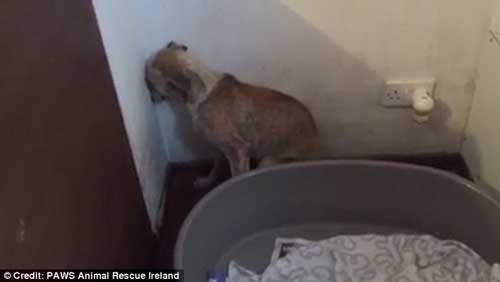 Community Rescue Pets
Community Rescue PetsDistressed and traumatized dog in a rescue shelter
The Danger Of People Rehoming Their Pets Themselves
Having said that, people taking their pet to a responsible animal rescue is much better than trying to re-home it themselves. People often advertise their pets Free to a Good Home, or for a low price, on social media.
This can have horrifying consequences for the animals, much more often than people realise.
Pets re-homed this way can often end up falling into the wrong hands. They can be used as bait dogs and tortured. Bait dogs are victims for dogs that have been trained to fight to the death, to practice on.
In other cases they can be sold, and then passed on a number of times, ending up in abusive homes.
They can be used solely as a breeding machine in terrible conditions to make money, or be subject to other terrible fates. Letting people know about what can happen can save pets from it.
People taking their pets to a responsible animal rescue to be re-homed means that this can be avoided.
Animal rescues are experienced in the area. They know to do proper checks on the adopters. Adopters also have to sign a legal agreement not to pass the pet on and instead to return it to the rescue's care.
COMMUNITY RESCUE PETS
Animal Foster Homes
When people foster animals through a rescue, the rescue will pay all necessary costs. These may be necessary veterinary costs, food costs, bedding costs. They may alternatively provide necessary items such as food and bedding.
If you offer to foster for a rescue, they will send a home checker to check your home will be a safe and secure for any rescue pets you foster.
Some rescues prefer foster homes to be in the same area as the rescue, but some rescues look for fosterers all over the UK.
Fostered animals often show a more attractive side to themselves than when they are in enclosures at the animal rescue.
This is because they feel less stressed, happier and more secure. As a result, this helps them be re-homed more quickly than they would have, feeling distressed in kennels.
Home Checkers
Many animal rescues have volunteer home checkers in their local area. However, when somebody from outside the local area of a rescue wishes to adopt from them, the rescue can call on a volunteer home checkers group on social networking websites, such as Facebook. Here is an example of one in the UK.
The volunteers in these groups are based all over the country and are willing to do home checks around where they live. They do this for animal rescues that are not local to them. This includes rescues in foreign countries.
Why Are Home Checks Done?
A home check involves a home checker meeting the prospective adopters in their own homes.
They are done simply to ensure the animal is going to a safe, loving and responsible home.
If a rescue is a responsible organisation, they must be careful and thorough.
What Happens?
The home checker will have the name, address, and contact details of the potential adopters sent to them. They will be asked to arrange a time with them for the home check.
The home checker will also have a questionnaire sent to them by the rescue. The potential adopters are often asked to show I.D and show proof that they live at that particular address.
It is a good idea for the home checker to ask the adopters, when they initially contact them, to have those items ready to show at the home check. Home checkers go through the questionnaire with the potential adopters, and take photo evidence of the proof of ID and address.
If the rescue is local to the prospective adopters home, the pet they are interested in may be taken to the home check.
It Is Not the Home Checker Who Ultimately Decides
It is the rescue, and not the person who does the home check that ultimately decides whether the people are suitable for the pet they are interested in, although the rescue does ask for the checker’s impressions and opinion.
If There Are A Lack Of Home Checkers
Pets Miss Out On Homes
Home check volunteer groups require volunteers anywhere and everywhere, as if there is nobody to do a home check on the potential adopters, the pet cannot be given a home there.
This, of course, has a knock on effect meaning a rescue space that could have been made available, is not.
The pressure that the over-loaded animal rescue community is under is enormous. Sadly, there are nowhere near enough rescue spaces to save all abandoned animals.
Not enough people are freeing up the rescue spaces by adopting pets, compared to the number of irresponsible people buying pets and then abandoning them when they become an inconvenience.
More information on being a home checker.
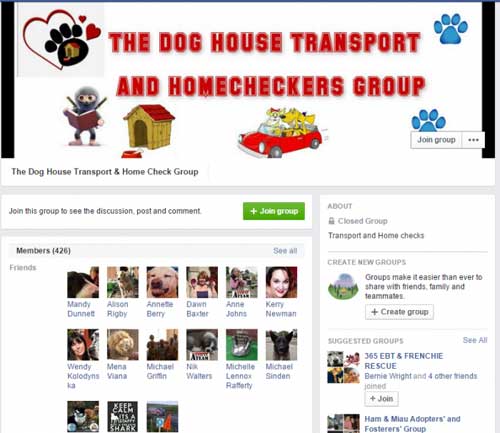 Community Rescue Pets
Community Rescue PetsAn example of a transport and home checker volunteer group people can join on Facebook
Animal Adopters
Every time somebody adopts a pet, they free up a life-saving rescue space that many animals are absolutely desperate for. They need them before their time at the pound is up, and they get put to sleep.
In fact, they save two lives: the animal they give a forever home to, AND the animal who gets the life-saving rescue space they made available by adopting.
There are So Many Rescues And Animals To Choose From
Adopters can adopt from:
- Local animal rescues
- Animal rescues anywhere in their country
- Foreign countries
They can choose from:
- General animal rescues or pet rescues
- General dog or cat Rescues
- Animal rescues specialising in specific breeds of cat or dog,
- Rescues specialising in specific sizes of dogs
- Small animal rescues
- Fish rescues
- Reptile rescues
- Horse rescues…
The list is endless. If the kind of rescue they want is not local, they will find it further afield. You can find any animal rescues you may want here.
More Adopters Are Always Needed
Because there are far more animals needing the rescue spaces, than there are rescue spaces, more adopters are always needed.
Sadly, the animals who are not lucky enough to find a rescue space are put to sleep at the local authority pound.
Oscar was one of many dogs seized from NFL player, Michael Vick, in 2008, after he personally subjected them to horrific abuse related to dog fighting. Rachel Johnson, who adopted Oscar, shares the story of his recovery, here.
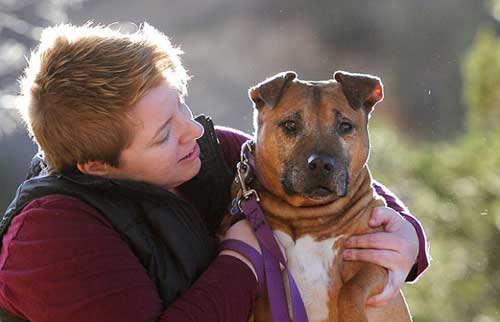 Community Rescue Pets
Community Rescue PetsOscar Saved From Michael Vick
Adopting Saves Lives, Buying Prevents Lives Being Saved
Each person who buys a puppy from a pet shop or breeder instead of adopting, means that a life-saving rescue space that could have saved a dog's life, doesn’t.
Buying puppies and kittens also encourages more breeding for money, even when there are already so many homeless animals needing their lives saved.
That results in more abandoned animals, and more innocent pets being put to death feeling frightened, unloved and alone.
COMMUNITY RESCUE PETS
So Many More!
There are so many more people involved in making sure all these elements can keep functioning, some of which are shown on the animal volunteer page.
Just one example is the people who run the fundraising events that make it possible for many of the elements of the animal rescue machine to operate. And of course without the supporters who take part in the fundraising events, it would not be possible.
If you would like to help be part of the big animal rescue family, have a look to see if you would be interested in any of the many volunteer roles.
What Can I Do To Help?
There is a huge problem of animals being put to death because they are abandoned by owners who did not realise the work and sacrifices involved in owning a pet.
The problem is also because too many people buy and breed new pets instead of adopting abandoned animals.
Raise Awareness
You can help by raising awareness of animal adoption, and of the issue of pet abandonment.
Also warn people about bad breeders, by sharing the information from this site on social media.
Making sure more people become aware of these issues is instrumental in helping to stop animal suffering.
Help Pets Being Given Away On Social Media Sites
Join groups on social media where people sell animals. Report posts that are selling pets, if it is against the policy of the social media site to do so.
Respectfully let people selling pets – especially for a low price or giving them away free – know about the dangers of doing so.
Politely encourage them to re-home their pet through a reputable rescue, as they do thorough checks and have legally binding contracts that the pet may not be passed on. It is always most effective if you are very tactful in your communication.
Encourage People Online Looking
To Buy Puppies & Kittens To Adopt
With people who post saying they are looking for a puppy or kitten, respectfully encourage them to adopt from a rescue. Let them know they can find rescues in their area on this page, and that there are general rescues, rescues for small breeds only, large breeds only, and rescues for specific breeds only.
Many people do not realise that nearly every breed has rescues dedicated to only them. So does nearly every species of animal and pet.
Let them know that they will be saving a life, and that the rescue space they make available by adopting a pet will save the life of a pound pet who would otherwise be put to death.
Let them know many pets in the pound are put to death because they only have a short period of time to have their lives saved by a rescue space, and there are nowhere near enough.
Every adoption means another innocent pet has avoided being put to death feeling lonely, unwanted and unloved.
Many More Ways To Help
If you cannot help stop the deaths of innocent pets by adopting, fostering or sponsoring, you can help by cross-posting pets looking for rescue spaces (sharing them on social media).
Animal rescues are also usually in need of volunteers to help in a variety of roles.
Even a small donation could mean the difference between an abandoned pet being saved or put to death.
Even just the price of a cup of coffee at a cafe, a cup cake, or a bottle of fizzy pop. The animals on the site also need cross posted.
How To Make The World A Better Place For Animals
Do you want to make the world a kinder place? Do you want to help stop terrified animals being put through horrific cruelty? You can do that.
Being an advocate for animals can be very emotionally draining and distressing, so it is vital you care for yourself too.
Have a look on this page to find out how to be an effective advocate for animals, whilst making sure you keep your mind healthy, strong, and happy.
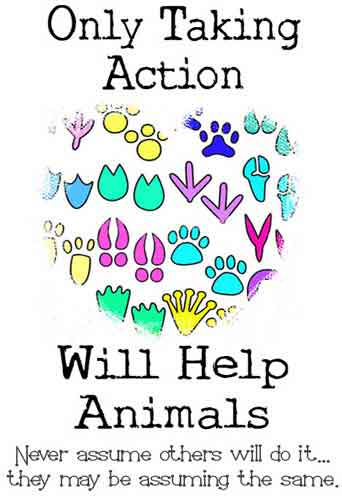 Community Rescue Pets
Community Rescue PetsOnly Taking Action Will Help Animals
Other Ways To Help Stop Animal Suffering
Here are more ways to earn and raise funds to help animals in need.
On this site, there are many varied ways you can help animals and help stop cruelty. In fact, there are so many ways that there is something for every personality type, no matter what their circumstances.
If you would like to learn more about why we so urgently need to help stop animal suffering, please see this website. It will allow you to broaden your knowledge of many types of worldwide animal abuse, giving you the ability to help animals by spreading awareness and answering questions people may have. Please be aware that you may find the information distressing, especially if you are a more sensitive person.
One great way to help animals is to share the information you have seen on this website. Doing so means more people could help stop animal cruelty, and that would make you responsible for more animals being saved from suffering. Together, we can help people help animals.
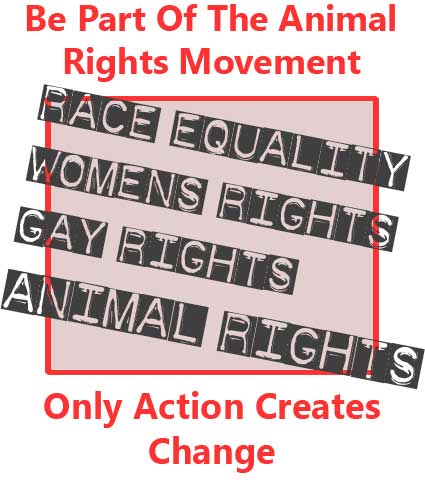 Be Part of the Animal rights Movement
Be Part of the Animal rights Movement